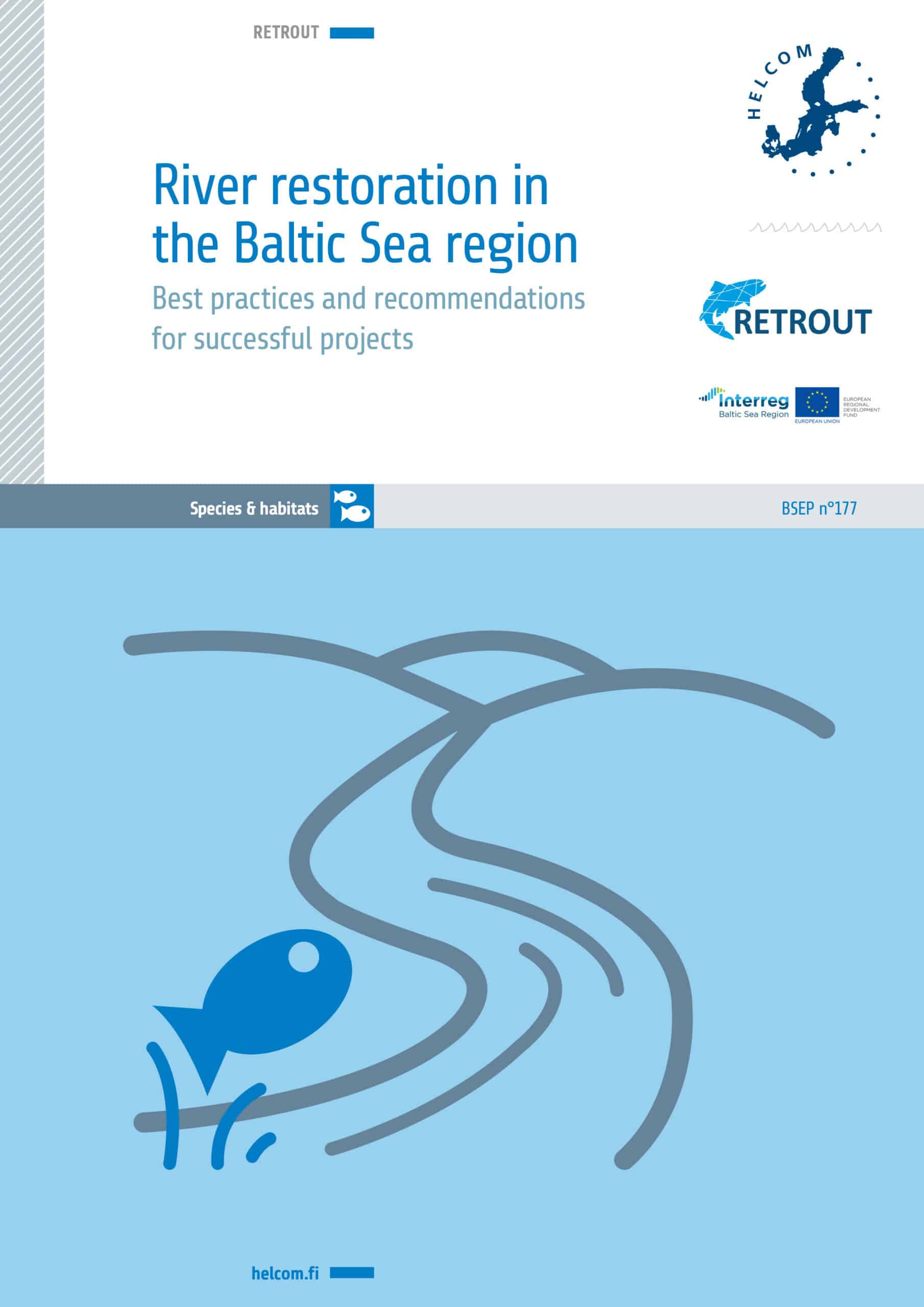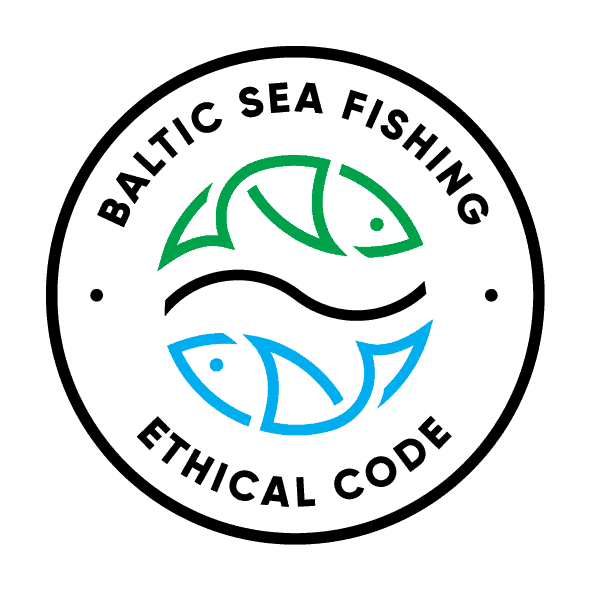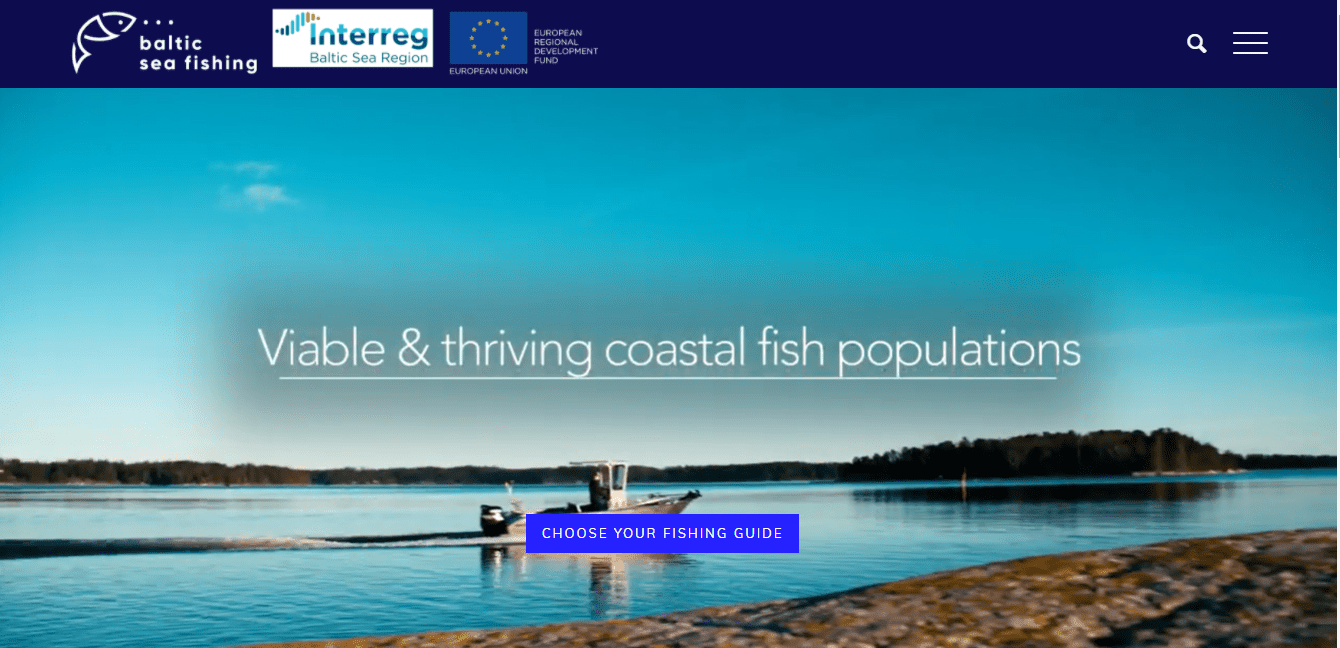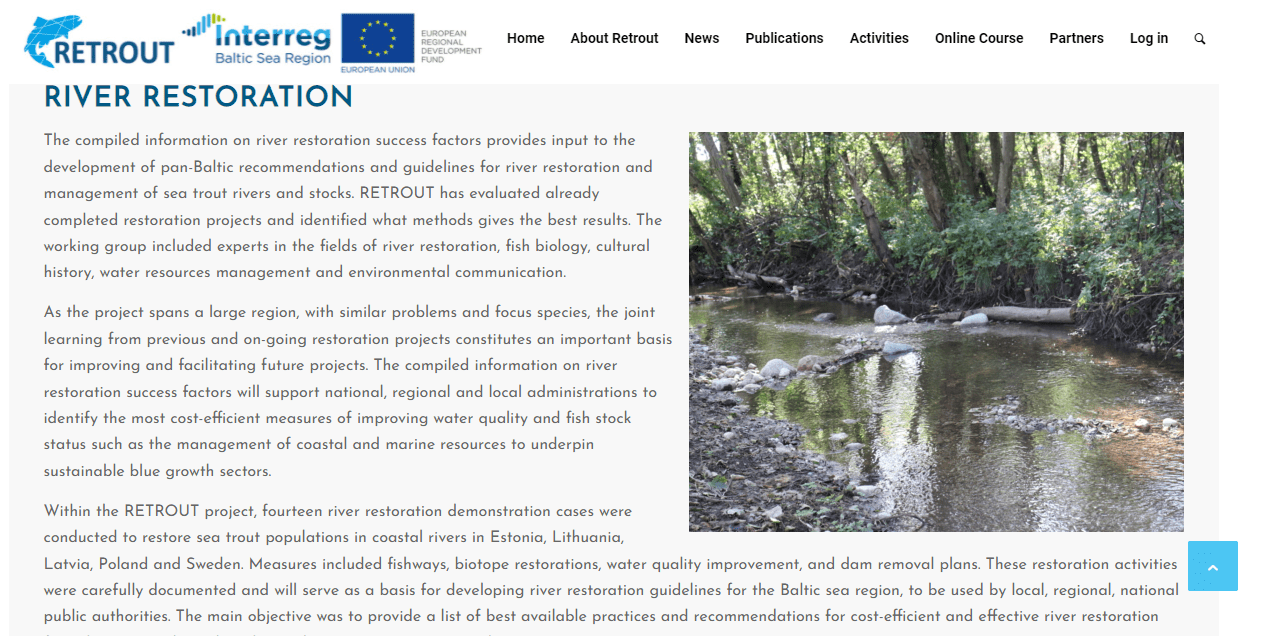RETROUT
Sustainable coastal fishing
Coastal fishing has steadily increased over the recent decades. The growing demand for coastal fishing triggers economic growth and provides the incentive to prolong the tourism season. The coastal fishing tourism sector in the Baltic Sea Region has great potential for sustainable jobs and diversification of the fishery sector. However, the sector is highly dependent on ecosystem services which, in turn, are dependent on a good environmental status of marine and coastal areas. The RETROUT project aims to enable this sector to develop and promote sustainable coastal fishing tourism.
Sea trout as a key species in recreational fishing
One of the factors that affect growth in coastal fishing tourism is a balance in sea trout stocks, which are dependent on the environment and restoration measures. Sea trout is a key species in fishing tourism, and the economic value of a sea trout caught is high. Therefore, there is a need for a better understanding of how to ensure sustainable management of sea trout stocks. Sea trout can be found in the Baltic Sea, but it reproduces in rivers. It means that reproduction conditions such as free passages in rivers and nursery areas are crucial to secure the steady growth of sea trout populations. Human interventions (e.g. mills or dams constructions) trigger obstacles for an increase in sea trout stocks. Thus, improvement and sustainable management of river habitats is an important measure to help the sea trout populations to thrive.
Budgets
in numbers
-
3.13MillionTotal
-
2.55MillionErdf
-
0.00MillionEni + Russia
-
0.00MillionNorway
Achievements
The RETROUT project is characterised by a truly sustainable and holistic approach to the development of touristic services.
Destination development programme
The project has worked to strengthen the stocks of sea trout by improving river habitats in the Baltic Sea region. Only sustainable stocks can support the sustainable use of fish as a natural resource. This in turn serves as the basis to create and market the Baltic Sea region as a sustainable recreational fishing destination. Following this approach, the partners from six countries across the Baltic Sea region rolled out a destination development programme. They developed 5 pilot sites in Stockholm archipelago (Sweden), Lahemaa (Estonia), Kurzeme (Latvia), Klaipeda (Lithuania), and Gulf of Gdansk(Poland). The pilots imply the development of touristic destinations where sustainable fishing trips and packages can be booked.
Joint activities help to tackle the transnational challenge
The project brought together sportfishing service providers, fishing guides and their associations, regional authorities, coastal municipalities and tourist boards. Transnational networking and peer learning resulted in the creation of a common eco-label and a platform to access fishing tourism-related services: Baltic Sea Fishing (BSF). For example, the BSF fishing guides support measures to improve the natural production of coastal and migratory fish by earmarking funds derived from fishing tourism to local fish conservation measures.
Outputs
River restoration in the Baltic Sea Region: best practices and recommendations for successful projects

Eco-brand "BalticSeaFishing" and ethical code of conduct

BalticSeaFishing web platform

River restoration

Project Stories
-
17.08.2021
Sport fishing in the Baltic Sea for economic growth and river restoration
Angling can help increase local fish populations while offering new local business opportunities. The Interreg project RETROUT boosted coastal fishing tourism. It helped local fishing guides to develop their destinations and restored sea trout rivers in six countries within the Baltic Sea region.Read full story
Partners
County Administrative Board in Stockholm
- TownStockholm
- RegionStockholms län
- CountrySweden
- RepresentativeHåkan Häggström
- Phone
- E-Mail
- Web
Haninge municipality
- TownHaninge
- RegionStockholms län
- CountrySweden
- RepresentativeErik Josephson
- Phone
- E-Mail
- Web
Baltic Environmental Forum Estonia
- TownTallinn
- RegionPõhja-Eesti
- CountryEstonia
- RepresentativeSandra Oisalu
- Phone
- E-Mail
- Web
University of Tartu
- TownTartu
- RegionLõuna-Eesti
- CountryEstonia
- RepresentativeMartin Kesler
- Phone
- E-Mail
- Web
NGO Estonian Fishing Tourism
- TownAudru
- RegionLääne-Eesti
- CountryEstonia
- RepresentativeNils-Erik Vallikivi
- Phone
- E-Mail
- Web
Kurzeme Planning Region
- TownSaldus
- RegionKurzeme
- CountryLatvia
- RepresentativeEdvīns Drigins
- Phone
- E-Mail
- Web
Institute of Food Safety, Animal Health and Environment - “BIOR”
- TownRiga
- RegionRīga
- CountryLatvia
- RepresentativeDidzis Ustups
- Phone
- E-Mail
- Web
Klaipeda University
- TownKlaipėda
- RegionKlaipėdos apskritis
- CountryLithuania
- RepresentativeNerijus Nika
- Phone
- E-Mail
- Web
Baltic Marine Environment Protection Commission, HELCOM
- TownHelsinki
- RegionHelsinki-Uusimaa
- CountryFinland
- RepresentativeHenri Jokinen
- Phone
- E-Mail
- Web
Ventspils Regional Municipality
- TownVentspils
- RegionKurzeme
- CountryLatvia
- RepresentativeEvita Roge
- Phone
- E-Mail
- Web
Administration of Klaipeda District Municipality
- TownGargždai
- RegionKlaipėdos apskritis
- CountryLithuania
- RepresentativeFeliksas Zemgulys
- Phone
- E-Mail
- Web
Campus Roslagen AB
- TownNorrtälje
- RegionStockholms län
- CountrySweden
- RepresentativeNandita Singh
- Phone
- E-Mail
- Web
SUCCEEDED by PP19 (01.10.2019) Maritime Institute in Gdansk
- TownGdansk
- RegionGdański
- CountryPoland
- RepresentativeMarcin Kalinowski
- Phone
- E-Mail
- Web
EU-CONSULT, Limited Liability Company
- TownGdansk
- RegionGdański
- CountryPoland
- RepresentativeKrzysztof Gutta
- Phone
- E-Mail
- Web
Gdynia Maritime University
- TownGdynia
- RegionGdański
- CountryPoland
- RepresentativeMarcin Kalinowski
- Phone
- E-Mail
- Web
-
Project managerHåkan HäggströmCounty Administrative Board of Stockholm
-
Legal representativeÅsa RydingCounty Administrative Board in Stockholm
-
Financial managerHanna HolmbergStockholm Province, Sweden
-
Communication managerGustaf AlmquistCounty Administrative Board in Stockholm



